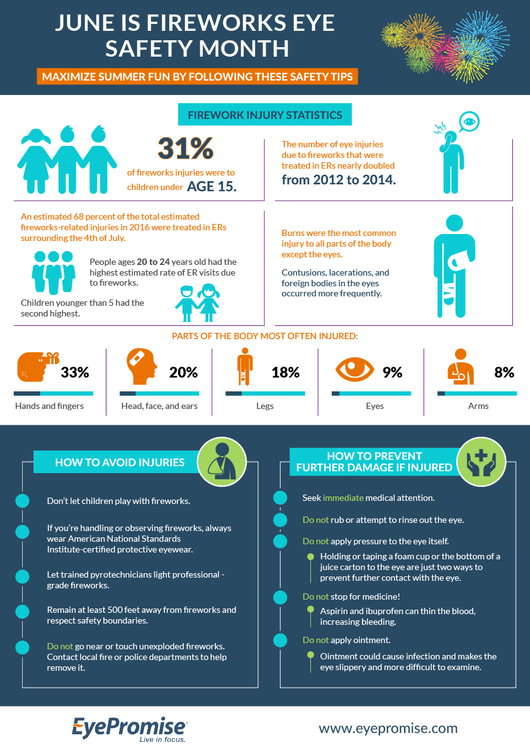Summer Safety Tips: What to Know About Firework Safety
Posted by amess on Jun 5th 2018
As the summer months start to kick into overdrive, it’s important that patients remain safe during seasonal activities. It can be common practice to shoot fireworks throughout the months of June and July, which is why the American Academy of Ophthalmology designated June Fireworks Eye Safety Month. Between June 18th and July 18th, there are an estimated 6,300 firework-related injuries, and over 20 percent of these are eye injuries. It’s important for your patients to know the dangers surrounding these explosives and basic firework safety. Download and share the infographic below to help educate your patient base.
Firework Injury Statistics
- 31% of fireworks injuries were to children under age 15.
- An estimated 68 percent of the total estimated fireworks-related injuries in 2016 were treated in ERs surrounding the 4th of July.
- People ages 20 to 24 years old had the highest estimated rate of ER visits due to fireworks.
- Children younger than 5 had the second highest.
- The number of eye injuries due to fireworks that were treated in ERs nearly doubled from 2012 to 2014.
- Burns were the most common injury to all parts of the body except the eyes. Contusions, lacerations, and foreign bodies in the eyes occurred more frequently.
- Parts of the body most often injured:
- Hands and fingers (33%)
- Head, face, and ears (20%)
- Legs (18%)
- Eyes (9%)
- Arms (8%)
How to Avoid Injuries
- Do not let children play with fireworks
- If you’re handling or observing fireworks, always wear American National Standards Institute-certified protective eyewear.
- Let trained pyrotechnicians light professional-grade fireworks.
- Remain at least 500 feet away from fireworks and respect safety boundaries.
- Do not go near or touch unexploded fireworks. Contact local fire or police departments to help remove it.
How to Prevent Further Damage if Injured
- Seek immediate medical attention.
- Do not rub or attempt to rinse out the eye.
- Do not apply pressure to the eye itself.
- Holding or taping a foam cup or the bottom of a juice carton to the eye are just two ways to prevent further contact with the eye.
- Do not stop for medicine!
- Aspirin and ibuprofen can thin the blood, increasing bleeding.
- Do not apply ointment.
- Ointment could cause infection and makes the eye slippery and more difficult to examine.
Sources
- Dang, Shirley. “Fireworks Eye Safety.” Edited by Brenda Pagan-Duran, American Academy of Ophthalmology, American Academy of Ophthalmology, 14 June 2017, www.aao.org/eye-health/tips-prevention/injuries-fireworks-eye-safety.
- “June Is Firework Eye Safety Month.” Fort Lauderdale Eye Institute, Fort Lauderdale Eye Institute, 27 June 2017, www.flei.com/blog/june-firework-eye-safety-month/.
- “Fireworks Eye Safety Tips.” VisionSource, Vision Source, LP, 5 Aug. 2016, visionsource.com/blog/fireworks-eye-safety-tips/.
- “Fireworks and Eye Safety: What You Need to Know.” Johns Hopkins Medicine Health Library, Johns Hopkins University, www.hopkinsmedicine.org/health/articles-and-answers/prevention/fireworks-and-eye-safety.
- “Prevent Eye Injuries from Fireworks!” Retinitis Pigmentosa | Prevent Blindness, Prevent Blindness, www.preventblindness.org/prevent-eye-injuries-fireworks.

